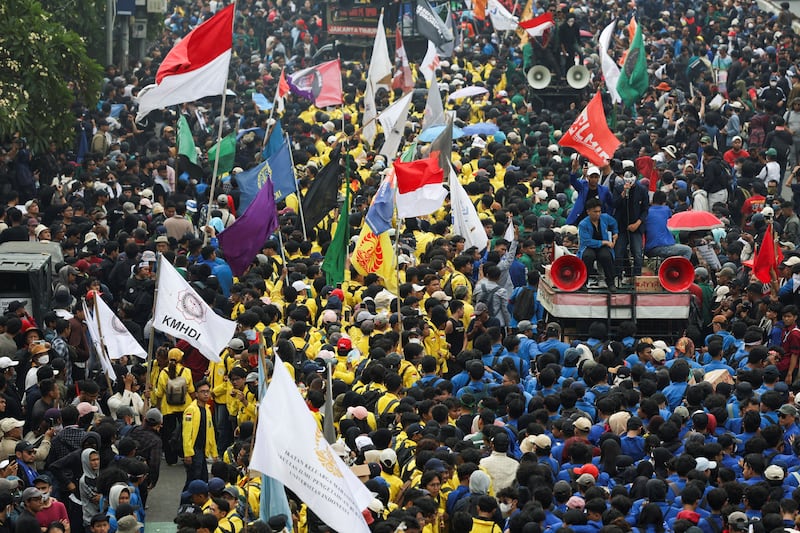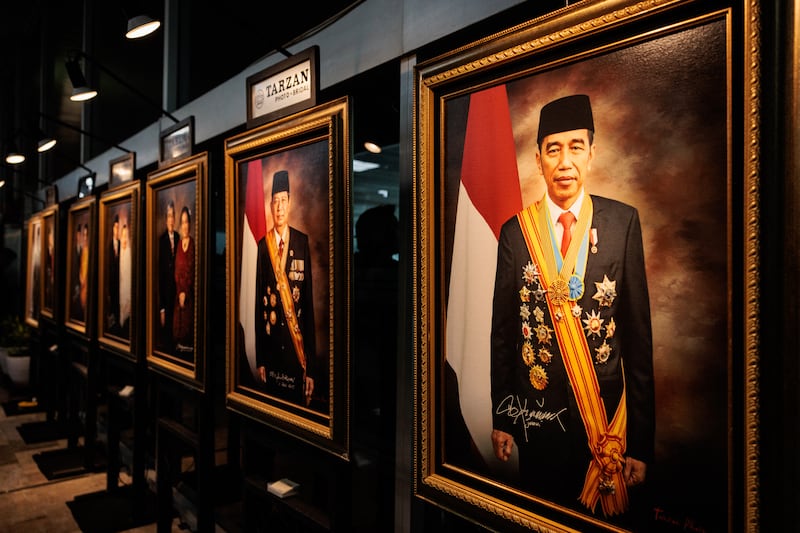Indonesian President Joko ‘Jokowi” Widodo will leave office later this month with a 7-percentage point drop in his approval rating since July, but with his popularity sky-high due to low inflation, a new poll shows.
However, some analysts doubted that this survey, or most opinion polls, reflect what people really feel. Indonesians, when surveyed, paint a rosier picture than exists because they want to steer clear of controversy, the analysts explained.
Still, Jokowi’s popularity fell from July because the public disapproved of the legislature’s attempt to change electoral rules that would have benefitted his youngest son, according to the survey conducted by Indikator Politik, a private pollster.
But mostly, Indonesians have been very pleased with the incentives offered during his 10-year presidency and the government’s handling of inflation.
The poll, conducted Sept. 22-29, shows that 75% of respondents were satisfied with Jokowi’s performance, down from July, when it was the highest, at 82%. His average rating in his second five -year term was nearly 71% and in his first, close to 66%, said Indikator Executive Director Burhanuddin Muhtadi.
“Public satisfaction with Jokowi’s performance has shown an upward trend throughout his two terms in office,” Burhanuddin said about the outgoing president’s huge popularity..
“Despite the economic downturn caused by the COVID-19 pandemic at the start of his second term, and the public’s perception that the national economic recovery has been slow, Jokowi’s approval ratings have continued to rise,” he said at a news conference.
RELATED STORIES
Jokowi was the first Indonesian president not to come from the political or military elite.
His administration has been praised for building toll roads, airports, and other essential infrastructure.
Yet, in the final year of his presidency, Jokowi’s administration has faced growing discontent over perceived political maneuvering. He has been accused of manipulating laws and influencing judicial appointments to further his political agenda.
Over the course of his presidency, critics say Jokowi’s administration has increased state surveillance, cracked down on dissent, and restricted free speech and assembly. This, they said, has resulted in a diminishing space for civil liberties in Indonesia.

Jokowi’s sustained popularity, despite these criticisms, is closely tied to his administration’s management of rising prices, according to Indikator.
Over his second term, inflation has averaged 2.84%, a marked improvement over the 5.62% seen under his predecessor, Susilo Bambang Yudhoyono, the pollster said.
Firman Manan, a political lecturer at Padjadjaran University in Bandung, said the findings were “not surprising.”
“For the majority of citizens, elite issues seem not to influence their overall acceptance of President Jokowi,” he told BenarNews.
“The survey confirms that dissatisfaction is greater among the higher-income and more educated minority,” he added.
According to the survey, more than 60% of the population, as one, wants three key issues addressed. They want a reduction in the price of basic necessities, the creation of more jobs and a decline in poverty.
Other priorities for the public include combating corruption, advancing agriculture, and improving infrastructure – areas that around 20% of respondents flagged as crucial, the Indikator survey found.
Firman said that the primary concerns for most citizens were economic issues.
The Jokowi government has provided various social assistance programs to lower-income groups since late last year, contributing to a generally positive sentiment.

Some analysts expressed skepticism about Jokowi’s approval ratings.
Firman Noor, a political analyst, said Indonesians often reported satisfaction in surveys as they feared they would lose access to social assistance, or because they were uncomfortable answering the surveyors.
“These surveys may not accurately reflect reality,” Firman, from the National Research and Innovation Agency (BRIN), told BenarNews.
Political researcher Dominique Nicky Fahrizal echoed Firman’s concerns, adding that people from lower socioeconomic backgrounds often took a pragmatic approach when confronted with survey questions.
“There is inconsistency when dealing with questions about presidential satisfaction. They usually prefer to avoid complications,” Nicky told BenarNews.
Meanwhile, Jokowi is spending the final weeks of his presidency traveling across Indonesia to bid farewell to the nation and acknowledge the shortcomings of his decade-long administration.
During a recent visit to a market in East Nusa Tenggara, he expressed regret to vendors and local residents.
“I’d like to apologize profusely for all the mistakes, any policies that may not have pleased the hearts of everyone,” he said over a megaphone.
“I am an ordinary human being who is full of mistakes, full of shortcomings, full of errors.”
